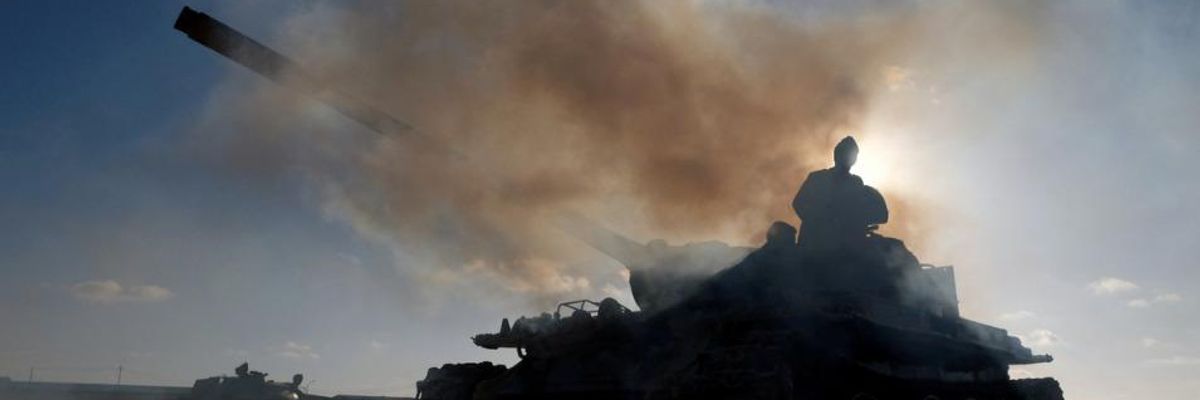A phone call from President Donald Trump to Libyan National Army leader Khalifa Haftar helped to escalate deadly violence in the Libyan capital of Tripoli this weekend, as well as undercutting the United Nations' hope for a ceasefire in the country.
A number of airstrikes, allegedly including strikes by armed drones, hit Tripoli in Sunday's early morning hours, escalating Haftar's assault on the city as he attempts to oust the U.N.-backed Government of National Accord (GNA) and take control of Libya. The Libyan National Army's (LNA) attacks on Tripoli have now killed an estimated 227 people, injuring more than 1,000 and leaving at least 16,000 displaced.
"The U.S. speaking out in favor of Haftar is a major event and could contribute to the GNA losing morale, or a splintering of the alliance against the LNA. And that increases the chances of a dirty, protracted urban conflict." --Jalel Harchaoui, Clingendael Institute of International Relations
The airstrikes followed a conversation Trump had with Haftar last week, which the White House revealed several days later on Friday. A number of sources reported Sunday that Trump appeared to give approval to the leader, who legal experts have accused of ordering his troops to commit war crimes, to move ahead with the air campaign--going against a U.N. Security Council resolution calling for a ceasefire last Thursday.
According to the White House's statement on Friday, Trump told the LNA leader he "recognized Field Marshal Haftar's significant role in fighting terrorism and securing Libya's oil resources, and the two discussed a shared vision for Libya's transition to a stable, democratic political system."
As Patrick Wintour reported in the Guardian:
The airstrikes on Tripoli, first launched last week, appear to reflect the approval given to Haftar by Donald Trump in a phone call on Monday....The U.S. appears to have accepted the view from its chief Middle Eastern allies that Haftar's assault can be seen as the act of a strong leader fighting jihadist militias in Tripoli. But many independent Libyan experts claim Haftar has no commitment to democracy.
Haftar ordered his troops into Tripoli on April 4, after three years of fighting to secure control of southern and eastern Libya. The strikes in Tripoli have been backed by the United Arab Emirates, reportedly with funding from Saudi Arabia.
"On March 27, one week before the offensive, Haftar visited Saudi Arabia to meet with King Salman and Crown Prince Mohamed bin Salman," Tom Stevenson wrote in the Middle East Eye Saturday. "There, the Saudi rulers appear to have offered support for Haftar's plans to take Tripoli. The Wall Street Journal has reported that Saudi Arabia supports and is financing Haftar's campaign."
In addition to undermining the U.N.'s hope for a ceasefire, Trump's call to Haftar also indicated a reversal in U.S. policy regarding Libya. On Friday, Acting Defense Secretary Patrick Shanahan told reporters, "A military solution is not what Libya needs," while Secretary of State Mike Pompeo said on April 7 that the U.S. "oppose[s] the military offensive by Khalifa Haftar's forces."
Russia joined the U.S. in refusing to back the U.N.'s call for a ceasefire last week.
"Trump and Putin's preference for a man with a questionable human rights record who, if successful, would likely rule Libya as an autocrat, reflects the two leaders' belief that stability in the Middle East and North Africa is best guaranteed by autocratic rule or some democratic facade behind which men with military backgrounds control the levers of power," wrote James Dorsey at Lobelog on Sunday.
Trump's undermining of the U.N.'s call for a ceasefire was denounced by critics including Rep. Adam Schiff (D-Calif.).
Juan Cole of Informed Comment was also among the critics who warned over the weekend that Trump's approval of Haftar's assault on Tripoli may carry disastrous long-term implications for Libya.
"Trump has proved himself obsessed with Middle Eastern terrorism and Middle Eastern oil, which he keeps saying the U.S. should 'take,'" wrote Cole. "Actually, unless [Haftar] wins in fairly short order, the fighting raises the prospect of taking Libyan oil offline for the duration. And [Haftar's] attempt to impose a dictatorship on a country that overthrew its last dictator, Moammar Gaddafi, has significant potential for ratcheting up terrorism rather than tamping it down."
"The U.S. speaking out in favor of Haftar is a major event and could contribute to the GNA losing morale, or a splintering of the alliance against the LNA," Jalel Harchaoui of the Clingendael Institute of International Relations told the Middle East Eye. "And that increases the chances of a dirty, protracted urban conflict."
